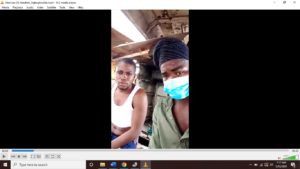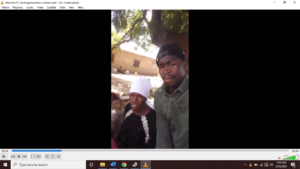Engaged Anthropology Grant: Peter Little

In 2016 Dr. Peter Little received a Post-Ph.D. Research grant to aid research on, “An Ethnographic Political Ecology of Electronic Waste Recycling and Risk Mitigation in Accra, Ghana”. Then in 2020 Dr. Little received an Engaged Anthropology Grant to aid engaged activities on, “Virtual Ethnographic Interpretations of E-Waste Work in Ghana in Uncertain COVID-19 Times.”
This engaged anthropology project stemmed from work carried out during a previous post-PhD research grant (“An Ethnographic Political Ecology of Electronic Waste Recycling and Risk Mitigation in Accra, Ghana”). During the grant period (January 2021-March 2021) I was able to accomplish most of the goals set out in my original proposal. First, I was able to engage in virtual ethnographic interpretation exercises with selected members of the village of Savelugu in Ghana’s Northern Region to learn how the COVID-19 pandemic is impacting the lives of Ghana’s e-waste workers. I hired two community researchers to conduct follow-up interviews with community members to get a sense for how the COVID-19 pandemic was impacting their lives, and some of these interviews, as depicted in Figures 1 and 2, were video recorded. The community researchers also photo-documented recent COVID-19 public messaging and handwashing infrastructure at Agbogbloshie (see Figures 3, 4, and 5). Throughout the grant period, I maintained contact with my community research partners via WhatsApp and Facebook.

Amidst the COVID-19 pandemic, I had assumed that many e-waste workers from Savelugu would seek alternative work, but according to interviews conducted by the community researchers, that was not the case. As the price of copper climbed (now around $4 USD a pound), the e-waste recycling sector experienced a boom as a result of a rise in demand in the global scrap metal supply chain.
Another goal of the grant was to collaborate remotely with members of Savelugu to translate key research findings from previous ethnographic fieldwork into Dagbani, the local language. I hired a community researcher whose task was to translate e-waste environmental health narratives. This is important because all the literature on e-waste in Ghana is currently in English and so having it translated into Dagbani would surely help village elders better understand the risks and challenges these e-waste workers face. In February 2021, my research collaborators helped translate collected interview data. For the first time, members of the Savelugu community were able to see e-waste narratives translated into Dagbani (see Figure 6).
Figure 6
|
“Pain in here [points to ribs and heart]. The stomach hurt. Chop [food], small small.”
“My chest hurts. Hard to sleep. Eyes be hurt, be burning.”
“Sometimes my body burns. The copper smoke disturbs me. At night I wake up 2 or 3 times because of heat. My son Martin also sick. He got malaria. He is disturbed by the smoke and is stuffed up all the time.”
“My body is no good. Fire work is hard work for here.”
“The fire and smoke disturbs me. The chest hurts. I not go to Korle Bu [Hospital] for check up.” |
“No good breathing. Plus my stomach hurt from small chop. Nobody come to help us with health. They test only the senior scrap workers here.”
“The smoke hurts my lungs. It disturb my lungs.”
“The smoke disturbs me. The fire heat hurt. The fire makes the head hot. I went to Korle Bu one month ago to check my health. No blood test. Nobody comes here to test you.”
“I have trouble sleeping. Chest hurts. The heat bother me. I have medicine for chest pain. The water is hot (water used to cool down hot copper) and hurts the skin. It get in my eyes and burn.”
“My chest burn. I take medicine for cough. I also get cut and burned.” |
|
“Kpɛ ka bɛrim bɛ. Puli maa bɛra. Dim bela bela”
“N nyoɣu n bɛra. N bɛ tooi gbɛhira. N nina n kumda ka zabira”
“saha sheŋa n ningbuna ku dirila boɣum. Kuriti maa Nyohi maa bobrima mi. Yuŋ kam buyi bɛi Buta ka tulim ŋo nɛri ma. N dapal Matinu gba ka alaafɛ. Malaria n gbaa gi o. Nyohi maa bobri o pam ka che ka fɛwufɛwu mali o saha sheli kam.”
“N ningbuna be niŋ ma nyaɣsim. Buɣum tuma mali wahala”. |
“ ti bi vuhiri vɛyelinga. Ka bindira maa gba bɛri n puuni. Ashibti tun’tumdiba bi kaari ti. Ti kpambi maa kɔ ka bi yuuna.” “Nyohi maa bɛrila n nyoɣu ni. Di bobrila n nyoɣu”. “Nyohi maa bobri ma mi. Tulim maa nyori mi. ka buɣum maa che ka zugu biira. Goli so ŋɔn kpi la ni n daa cheŋ Korle Bu ni n ti lihi n daa alaafɛ zuɣu. n daa bi voogi n ʒɛm.
“Ashibti tun’tumdiba bi kanna n ti kaari ya”.
“n bi tooi gbehira. Nyo’moɣli. Tulum maa bobri ma mi. n mali nyoɣu ni tim. Kom maa tuli mi (ko’sheli din maari kur’tula)
|
Finally, a goal of this engaged anthropology grant was to develop a photo exhibit in the primary school in Savelugu to help teach village youth about the life experiences and risks faced by Ghana’s e-waste workers. This is still an ongoing project and the exhibit will hopefully be up in a local school in Savelugu by the end of the summer. Thus far, I have worked with my community collaborators to select a series of photographs from the project to be used for this photo exhibit. These photographs have been re-sized and printed on foam board and were shipped to Savelugu in early May 2021. See some of the selected photographs in Figures 7, 8, and 9.